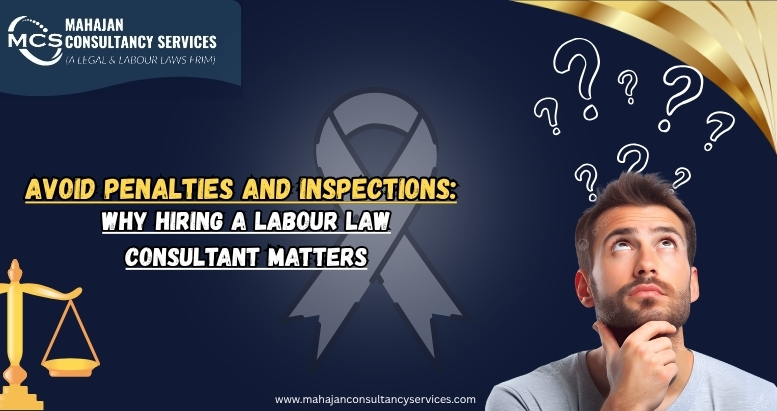Labour law compliance is one of the most critical responsibilities for employers in India. From Provident Fund (PF) and Employees’ State Insurance (ESI) contributions to minimum wages, working hours, and workplace safety, businesses are required to comply with a complex set of statutory regulations. Non-compliance can lead to penalties, interest charges, audits, and inspections from authorities, which can disrupt operations and damage the company’s reputation.
Hiring a professional labour law consultant ensures that businesses remain compliant, reduce legal risks, and manage regulatory obligations efficiently. Mahajan Consultancy, a trusted provider of legal and corporate advisory services, helps organizations navigate labour laws and avoid costly mistakes.
Understanding the Role of a Labour Law Consultant
A labour law consultant is an expert in employment and social security legislation in India. Their role includes:
- Advising employers on compliance with PF, ESI, minimum wages, and labour regulations
- Reviewing HR policies and employment contracts for legal adherence
- Conducting audits to identify gaps or risks in statutory compliance
- Assisting with inspections, disputes, and appeals with regulatory authorities
By bringing specialized expertise, consultants help businesses maintain proactive compliance, preventing errors that could lead to penalties or inspections.
Common Penalties and Risks for Non-Compliance
Employers in India often face penalties for violations in areas such as:
1. Provident Fund (PF) Non-Compliance
Late or incorrect PF contributions result in:
- Interest charges on delayed payments
- Penal damages for prolonged defaults
- Legal action in case of non-deposit of employee contributions
Incorrect PF records or incomplete documentation often trigger EPFO inspections.
2. Employees’ State Insurance (ESI) Non-Compliance
Delays in ESI contributions or errors in employee registration can result in fines, interest penalties, and legal scrutiny. Non-filing of ESI returns may also lead to notices from authorities.
3. Minimum Wages and Payment Violations
Failure to pay statutory wages or overtime correctly can lead to penalties under the Minimum Wages Act and Payment of Wages Act. Such violations are often discovered during government inspections or employee complaints.
4. Workplace Safety and Health Violations
Non-compliance with safety and occupational health regulations under the Factories Act or state laws can result in fines, work stoppages, or legal liability in case of accidents.
5. Labour Law Inspections
Inspections by labour officers or regulatory authorities are common, and they often uncover multiple non-compliance issues. Unprepared employers may face fines, penalties, or prolonged legal proceedings.
How a Labour Law Consultant Helps Avoid Penalties
1. Proactive Compliance Audits
Consultants conduct regular audits of PF, ESI, wages, working hours, and other statutory obligations. Early identification of gaps allows businesses to take corrective action before authorities intervene.
2. Accurate Documentation and Record-Keeping
A consultant ensures that all employee records, payroll data, attendance registers, and social security contributions are complete and accurate. Proper documentation significantly reduces the risk of penalties during inspections.
3. Timely Updates on Legal Amendments
Labour laws are constantly evolving, and employers often miss important amendments. Consultants provide timely guidance on changes in regulations, ensuring that HR policies and payroll systems are always up to date.
4. Preparation for Inspections
In the event of a government inspection, consultants help organize records, verify compliance, and assist in presenting information accurately. This minimizes disruption and reduces the likelihood of penalties.
5. Employee Training and Awareness
Labour law consultants train HR teams and management staff on compliance requirements. Educated teams are better equipped to handle statutory obligations, maintain records, and prevent inadvertent violations.
6. Guidance on Appeals and Disputes
If penalties or notices are issued, consultants provide support in preparing appeals and representing the company before authorities. This improves the chances of favorable outcomes and reduces legal exposure.
Why Businesses Should Hire a Labour Law Consultant
1. Minimize Financial Risk
Penalties, fines, and interest charges can significantly impact a company’s finances. A labour law consultant helps avoid these costs by ensuring timely and accurate compliance.
2. Reduce Operational Disruption
Inspections and disputes can halt operations or require extensive administrative work. Consultants streamline compliance processes, reducing the chance of interruptions.
3. Ensure Legal Protection
Consultants help companies maintain proper records, contracts, and HR policies. This documentation provides legal protection in case of inspections or disputes.
4. Focus on Core Business
Managing labour law compliance internally can be time-consuming. Outsourcing to experts allows management to focus on strategic business activities without compromising on regulatory adherence.
5. Build Trust with Employees
Transparent compliance practices foster trust among employees. Knowing that wages, benefits, and workplace safety are managed properly improves morale and retention.
The Mahajan Consultancy Advantage
Mahajan Consultancy specializes in labour law compliance advisory and offers tailored services for employers in India. Key benefits include:
- Comprehensive audits of PF, ESI, and other statutory obligations
- Drafting legally compliant HR policies and employment contracts
- Automation guidance for payroll, social security contributions, and record-keeping
- Expert assistance during inspections and legal disputes
- Continuous updates on amendments in labour laws and regulations
By leveraging Mahajan Consultancy’s expertise, businesses can avoid penalties, stay inspection-ready, and maintain consistent compliance in 2025.
Best Practices for Employers
- Conduct periodic internal compliance audits
- Maintain accurate payroll, attendance, and employee records
- Implement automated systems for PF and ESI contributions
- Stay updated on amendments and regulatory notifications
- Train HR teams and managers on statutory obligations
- Engage professional legal support to mitigate risks
- Respond promptly to notices or queries from authorities
Following these best practices ensures smoother operations, reduces legal exposure, and improves overall corporate governance.
Conclusion
Hiring a labour law consultant is no longer optional for Indian employers in 2025. With evolving regulations, stricter enforcement, and increased inspections, businesses face significant risks if compliance is neglected. Labour law consultants ensure timely adherence to statutory obligations, minimize penalties, and prepare organizations for inspections.
By partnering with Mahajan Consultancy, employers can streamline compliance processes, maintain accurate documentation, protect legal interests, and focus on growth without disruption. Professional advisory services are a strategic investment to safeguard both the business and its employees.
FAQs
- What is the role of a labour law consultant?
A labour law consultant advises employers on statutory compliance, conducts audits, prepares documentation, and assists with inspections and disputes. - Why is labour law compliance important in 2025?
Non-compliance can lead to penalties, interest charges, inspections, and legal disputes due to stricter enforcement by authorities. - What common penalties can employers face?
Penalties include fines for late PF or ESI contributions, incorrect wage payments, and violations of workplace safety or labour regulations. - How does a consultant help with inspections?
Consultants organize records, verify compliance, and guide employers during inspections to minimize legal and financial risk. - Can hiring a consultant reduce financial penalties?
Yes, proper guidance ensures timely deposits, accurate documentation, and adherence to legal requirements, reducing fines and interest charges. - Do consultants provide employee training?
Yes, they train HR teams and management on labour law compliance and statutory obligations. - How often should a company engage a consultant?
Regular engagement is recommended, especially before audits, inspections, or legal changes affecting compliance. - Are consultants necessary for small businesses?
Even small businesses benefit, as consultants help avoid errors that could result in disproportionate penalties. - How does Mahajan Consultancy assist employers?
They offer audits, compliance advisory, documentation support, inspection preparation, and guidance on amendments in labour laws. - What are the long-term benefits of hiring a consultant?
Reduced legal risk, operational efficiency, employee trust, better governance, and avoidance of penalties or inspections.




